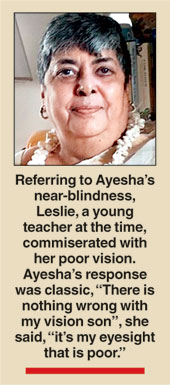 |
It is hard for the teaching community of Calcutta to come to terms with Ayesha’s death. We had believed that her indomitable spirit could conquer anything but the summons had come. In her daughter Srila’s words, “at 18:22 (on March 26, 2014) the heart reading suddenly said ‘0’ and in that one numeral there was a change in all our lives forever”. The morning after, I received a call from John Mason. “I feel lobotomised” he said, echoing the thoughts of many.
Ayesha Das (formerly Chatterjee) was an icon in our city. I have over the years, met innumerable teachers, young and old, who have been shaped by her. Ratna Sarawgi, a primary education expert herself, said, “If you see any feathers on the caps that are doffed to her you can be sure that she put them there.”
A day later, Leslie D’Gama, a former teacher of St. Xavier’s Collegiate School, shared an anecdote with us. Referring to Ayesha’s near-blindness, Leslie, a young teacher at the time, commiserated with her poor vision. Ayesha’s response was classic, “There is nothing wrong with my vision son”, she said, “it’s my eyesight that is poor.”
She lived a heroic life and many of us were astounded by her sheer courage and irrepressible enthusiasm for new experiences, her yearning for adventure, and her cheerful disposition in both gentle and tough times. She was generous to a fault and her heart and purse were always wide open. She disliked being told to be cautious about people or to be careful with her money. Ayesha was a happy, sparkling larger-than-life person who spread joy and kindness wherever she went.
Ayesha’s professional life began and ended with her single-minded devotion to primary education. Like Robert Fulghum, she believed that ‘all you need to know you learn in kindergarten’. As the sole force behind all the programmes conducted by the Teachers’ Centre, she organised unforgettable annual events. In Lively Learning, member schools showcased their class projects while Focus the Child invited schoolteachers from all over the country to share their ideas on child education and she brought down scholars like professor Krishna Kumar and Andre Beteille to address them. At the end of each programme every single participant would receive an individualised hand-written thank you note which invariably made her or him feel very special. And every Christmas she would prepare a nativity play with the neighbourhood kids. For years she organised such exciting summer camps for children that you will hear men and women in their mid- forties still raving about the fun they had “learning with Aunty Ayesha”.
Ayesha, Uma (Ahmad) and Katie (Dalal) formed a triumvirate which was inextricably associated with the Teacher Training Department of Loreto College and the Teachers’ Centre at Loreto House. Uma says that she met Ayesha in the 1960s and “immediately fell under her spell”. The ‘triumvirate’ promoted child-centric learning in different ways. Ayesha wrote several books for teacher trainees and children such as Pleasurable Reading and Just like Me which were delightfully illustrated by Katie. In Uma’s words, Ayesha’s relentless crusade against regimented teaching released generations of children from sitting silently in rows and copying from the blackboard. Uma remembers Ayesha exclaiming, “How can you teach children to speak or communicate when you tell them to put their fingers on their lips!”
Ayesha insisted that I should inform her whenever any piece I had written was published. Katie would sometimes send her cuttings but Ayesha soon became tech-savvy and got somebody to google-search and open links. This is not at all a fitting tribute I know — the untold stories are really the significant ones. Nevertheless I wish I could send it to her. I can clearly see Ayesha’s expressive face changing with pleasure as somebody read it out — she needed very little to be happy. I will miss receiving her email saying, “Thank you but you have given me a very big head.”
Ayesha’s children are planning her homecoming to Calcutta. Her ashes will be buried at the Bhowanipore cemetery and some will be scattered on Park Street where her home is. Her flat in Queen’s Mansion nicknamed “The Grand Central Station” was a meeting point for many. It was always filled with fun and laughter accompanied by much eating and drinking.
We believe that Ayesha’s spirit will continue to spread warmth and joy and light among us. You see it is impossible to feel sad when you think of Ayesha.
The writer is president, Teachers’ Centre, Calcutta










